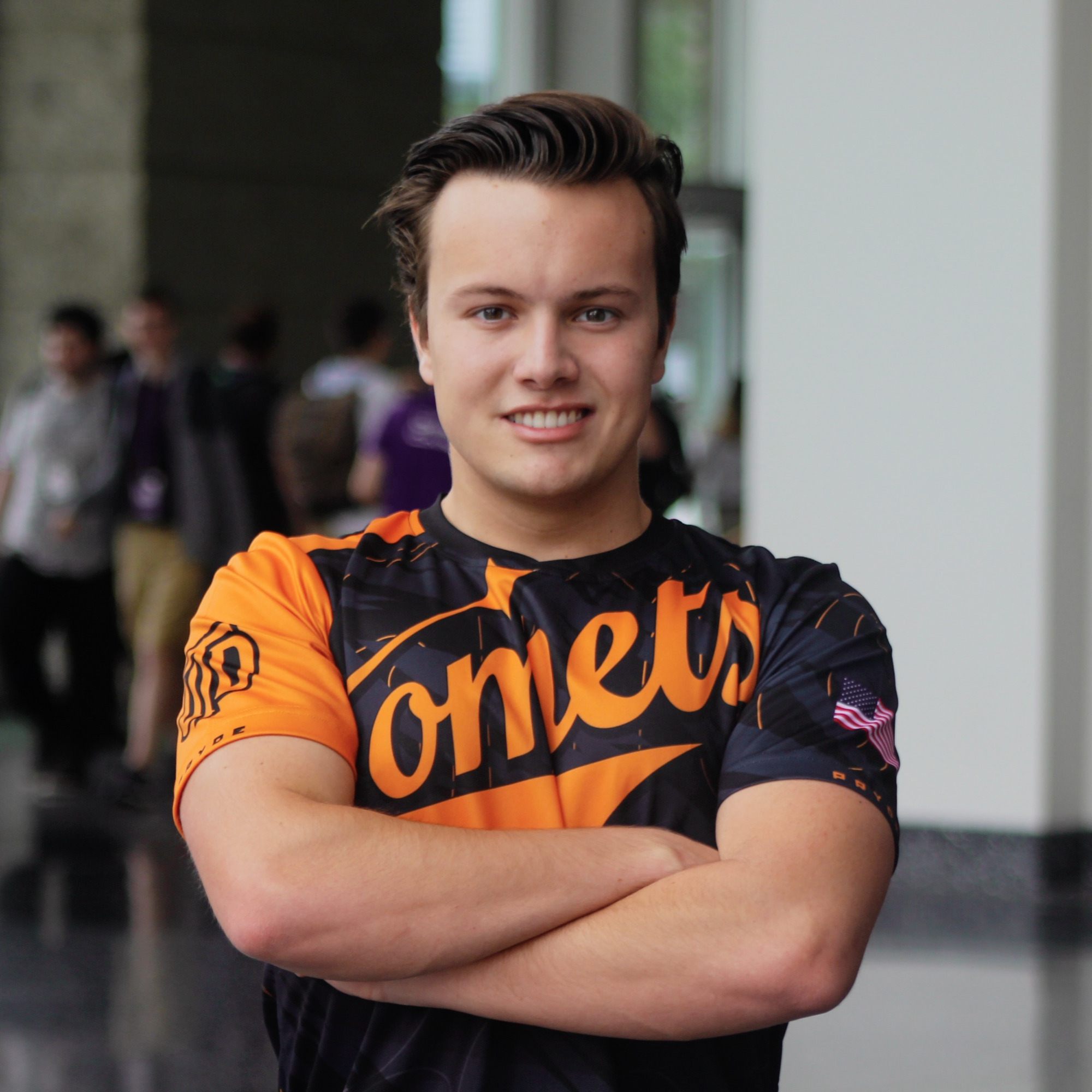
I just hit my two year anniversary graduating from the University of North Texas as an undergraduate with my bachelor’s degree in finance. While I attended a large ceremony and received my degree from the Dean, the most recent graduates are not as lucky. College campuses across the country have been hit hard during the spring semester with COVID-19 and have been placed in worrisome financial states. The declining revenue from housing fees and the additional costs of online courses have made colleges eager to implement strict health measures to return back to normal. Despite these restrictions, students returning to campus seem very optimistic on being able to have a fun semester. An August 2020 poll by Insider Higher Ed reported that 72% of students were at least somewhat confident that they could complete the fall semester without interruption. I reached out to Eric Aaberg, a junior marketing student and Student Director of Esports at the University of Texas at Dallas, to discuss his experiences on campus.
Hello Eric, even if there are no additional delays, what will an average day look like for a college student and will this have any long-term effect on admission levels?
Let’s be honest, this semester definitely wasn’t what we thought was going to turn out back in January 2020, honestly, we didn’t even know what was going on still in July 2020 if we’re being honest. Were students confident? Sure. Optimistic? Absolutely. But honestly, I think most of us still have not fully processed what we are going through right now (a literal pandemic). During the Spring semester, it felt like a gap of my life of nearly 6 months was just “cutout” and within 24 hours when our clocks struck Friday, March 13th, our entire lives and college future changed… and we had no idea what was coming.
I remember the day of that Thursday, March 12th, where all of the students on our campus received an email from the President saying that we were going to have a delayed Spring Break, we all thought immediately “Oh sweet! An extra week of Spring Break!” There was already talk about COVID-19 within the student base, and I recall just days before a friend of mine who was involved in their COVID-19 Safety Committee talk about the school most likely shut down – but still this wasn’t something I really thought was going to happen. Boy was I wrong.
So flash forward to August 2020, where our original plans for all institutions to come back to campus face-to-face have changed, we now see university’s adopting this “Hybrid” model – however, with the still caution of COVID-19 I’d estimate that not even 10% of students are going face-to-face (living on campus myself). What does a normal day look like for us students on campus? A lack of student life for sure. Rather than the exciting and big events we annually have to welcome students on campus, we’re given Microsoft Teams and Zoom links to attend “virtual” events, and while this is a nice gesture from those planning these events, it’s not the same and I’ve seen first-hand many freshmen just feel a lack of connection to their university, feel like they have no friends/can’t make friends, or just feel lonely… which breaks my heart being a very dedicated student leader to my campus (The University of Texas at Dallas).
If you ask me, this semester is more about being creative and finding new ways to connect students – not trying to convert older ways digitally. How have I and other passionate students done that? We have a team called Comet Life on campus dedicated to enhancing and focusing on student life, and something we’ve been doing is connecting thousands of students through the UT Dallas Discord. Additional initiatives have been connecting students over social media, movie nights, and gaming nights. But yes, it definitely is not the same experience – and to some, it wasn’t worth spending money to move back to campus housing or even start college this semester. Ironic, a lot of universities’ tuition actually increased or stayed the same with online learning (https://www.texastribune.org/2020/08/24/texas-tuition-universities/). If you asked me, I would have preferred universities to save money from not opening all these campus buildings, move everything online, and reduce tuition for students – because no one’s using half of these campus buildings anyways.
On another hand I think ALL higher education institutions as well as primary education schools should have taken a universal “GAP” semester/year around the board, that way we reduce all the chances of COVID outbreaks on our campuses and no one gets left behind – because I along with a lot of students also contemplated taking a gap semester to focus on financials and maybe picking up an additional job to ease some of the financial stress COVID-19 has brought (plus things are going to just be “Zoom University” anyways, right?). Oh, and let’s not even mention the stress of students right now because they can’t concentrate on their classes with a pandemic happening.
Will this have a long-term effect on admissions for future semesters? Absolutely. We’re in, as everyone likes to call it, an “unprecedented time” which means that no one really knows what’s going on or what to do. I’ve picked up the vibes that truly no one in the world (when I say no one, I mean all my student friends, peers, etc.) has any idea when this is going to end. In relation to that, yes admissions are going to change and I think many students are also going to focus on how colleges responded to COVID-19 in regards to relation to the students, when selecting to return/attend college. I know some friends who went to IVY league universities where they found their colleges’ response including kicking them out of their university housing without refunds, serving them the bare minimum quarantine food, or really just showing their “true focus” on their students – which makes me even more thankful for how my university has cared so much for our students, and I have great faith in our administration. Also, our school’s Vice President of Student Affairs literally was handing out cute free TEMOC (UTD’s mascot) decorated masks to students – these constant acts of kindness really shine bright for UTD’s love for their students, which makes me even more reassured even 2 years later that I picked the right home. 🙂
A poll by Barnes and Noble in early April showed that 40% of students weren’t confident in the transition from in-person courses to virtual classes. Why do you think students were nervous about this transition and were there any concerns you or other students had to overcome?
I’m not surprised that number isn’t higher because I would include myself in not really feeling the most confident about transitioning from in-person to virtual classes. Why? Because I thrive off the personal connections with my professors and instructors, I always ask questions and interact in every class session, and I get constant motivation from being able to walk on my campus every weekday and see my friends in/out of my classes. The switch to online classes really removes all of these aspects, and while I’ve seen some of my professors be very engaging via our digital calls, it is inevitable that some courses are not as engaging, students get lost and left behind, or simply that students get demotivated because they miss the lack of personal face-to-face connections and that sense of student life. I mean, it’s your college experience! Of course people aren’t going to be confident with that being moved online! This is something us teenagers and rising adults always dream and hype about.
There are various reports showing universities with issues filling out vacant residential halls. UT Austin reported that “Out of 7,300 open spots, a total of 4,500 students have committed to living on campus”. Do you think this has more of a positive or negative effect on continuing students and will it have any type of long-term effect on dorm layouts and student housing?
Let’s talk about the positives of less students in campus housing: Less chances of COVID-19 outbreaks.
Now, let’s talk about the negatives: Lack of other students to engage with (those that are online), possibility of being put in a room without a roommate, decrease in operation funds and revenue for University Housing Departments, demotivation for University Housing Staff and University Staff, and overall less contribution towards the “campus life” for those living on campus.
I know a good handful of friends who moved onto campus and then within a few weeks just moved back home, because there wasn’t enough reason/benefit for paying for University Housing. I mean, that is a fact and there’s no fighting it – COVID-19 has changed our college campuses indefinitely and we’re not sure when it’s going to return back to what we used to call “normal.” As for long-term effects, no I really do not see a huge change or shift in adopting new dorm layouts. Here at UTD we have Residence Halls which feature three individual suite rooms with a common living room space per actual suite/room, so I’ve never had the experience of the traditional “sharing a room with a roommate” type of experience.
With more courses put online and additional restrictions, how have campus organizations been responding and how have they been able to foster a community in a time of limited face-to-face interactions?
Campus and student organizations have had an immediate halt on in-person interactions, as they should be. I really prefer this new “normal” vs. being sent back home like last semester and I don’t think we (or any other college) should risk it. In terms of fostering a community, UT Dallas Comet Life, a student-team focused on the student life at UT Dallas, has created tons of new initiatives to connecting students digitally – such as utilizing social media channels to connect and interact with students, and directing students to the UT Dallas Discord, the new hub for student life. The Discord Server hosts thousands of students where they’re able to connect with each other, chat together about specific topics, call over voice-channels, and participate in virtual events hosted by our student-team such as Netflix Parties and gaming nights (we actually were just featured by Discord themselves: https://blog.discord.com/community-spotlight-ut-dallas-discord-b8934b19a886).
At the end of the fall semester you had many students like John Novakovich, a Northwestern University economic undergraduate student, have luxurious job offers rescinded due to the economic conditions of COVID-19. Has this made you more proactive on networking and has the university developed anything to ensure smooth transitions from graduation to a job offer?
I’m a Junior Marketing Student, so I’m not entirely focused nor involved with how graduation is working on my campus – but I definitely have heard from friends who have lost internship or full-time job opportunities due to COVID-19. For me, I’m focusing on digital content and personal branding. Since I already have developed a fairly in-depth marketing job experience, I’m focusing on having fun with my own digital content and being creative on how to connect with other students. Which, at the end of the day, growing my personal brand and social media accounts will be allowing me to increase my networking outreach.
On June 19th, the Mississippi State Health Officer Dr. Thomas Dobbs announced 381 new COVID-19 cases with some patients being linked to different fraternity rush parties in the area. Do you think the students on your campus have been compliant with university rules and has there been any noticeable stress with students not being able to attend weekend parties?
UT Dallas has done a great job in making it very clear that current in-person student organization events and student gatherings are banned/halted until further notice, and I’m super proud of our community. UTD has not have an outbreak in positive COVID-19 cases and it makes me feel reassured knowing our administration has taken numerous safety measures to protect our students together. And stress because students can’t attend parties? You’re asking the wrong university as a big focus of our student-base has been more focused on keeping cases down and have been more-so interacting together digitally.

